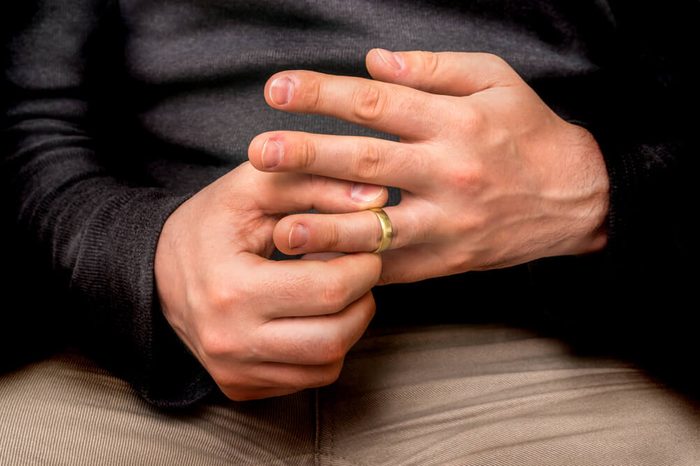
Negative thinking
Freshmen who were randomly paired with roommates highly prone to brooding were likely to “catch” their negative-thinking style after only three months, found a University of Notre Dame study. Recognize that other people may influence how you respond to life’s challenges. (Also, did you know you can create positive energy by placing these traditional good luck items in your home?)

Happiness
On the other hand, positive feelings also rub off, according to a seminal study of almost 5,000 people by researchers at Harvard and the University of California, San Diego. When you feel happy, a friend who lives within one mile is 25 percent more likely to feel happy, and neighbours are 34 percent more likely to feel happy. The same data found that an extra $5,000 increased happiness by about two percent, a much lower impact than what’s gained by having a joyful friend of a friend (a second-degree connection), which can boost your own good feelings by 10 percent.
(Psst: Here’s what psychologists wish you knew about happiness.)

Quitting smoking
The same research team found that when one person quit smoking, close friends and family members became 36 percent less likely to smoke. The ripple effect: Even very casual acquaintances of the initial quitter became 20 percent less likely to light up.

Stress
The brain is hardwired to detect stress in other people, such as increases in breathing rate. This triggers a cascade of our own stress hormones, says Heidi Hanna, an executive coach and author of Stressaholic. And you don’t need to be in the same room to catch someone else’s stress, which is transmittable via email, texts, and social media. (Curt responses could signal someone is under a tight deadline, for example.) When you feel stressed, take breaks and get enough sleep—that’s not selfish. It benefits everyone around you.

Itching
If you’ve seen someone else scratch an itch and suddenly felt your own skin tingle, you aren’t alone. A study in the journal Science found that mice started scratching themselves when they looked at chronically itchy rodents. In fact, the normal mice near their extra-itchy counterparts ended up scratching twice as often as usual.

Desire for new things
It’s no coincidence you suddenly want a new car after your friend’s visit to the dealership. A 2012 study in the Journal of Neuroscience found that participants rated objects as more valuable when they thought someone else wanted them. “I call this wedding-band syndrome,” says psychologist Elizabeth Lombardo, PhD, tells Prevention. “A man is more attractive if someone already wants him—he must be worth having.” Shut the green-eyed monster down by reminding yourself of how thankful you are for what you already own.

Weight loss
A study in the journal Obesity found that volunteers who started a weight-loss program, their partners dropped pounds at about the same rate as them. Use the ripple effect to your advantage by enlisting your partner to join you on your weight-loss journey. Plus, here are some tips to help you lose weight in a healthy way and keep it off for good.

Loneliness
You’d think distance would keep lonely people from spreading their isolation, but the opposite is true, according to a study in the Journal of Personality and Social Psychology. The findings suggested that after someone started feeling lonely, others in that person’s social group would get lonelier over time, too. The feeling acted like a contagion, rather than a result of lonely people being attracted to other lonely people. The researchers believe groups tend to blow off lonely people, which keeps the cycle going.
Nip the cycle in the bud by reaching out to friends you haven’t heard from in a while, and use these tips to beat loneliness.

Divorce
A 2013 study in the journal Social Forces found that friends of divorcees were 75 percent more likely to get a divorce than someone whose friends were still married. When a friend of a friend got divorced, married couples were 33 percent more likely to split. The study authors suggest that helping friends work out their relationship issues could strengthen your own relationship, too. The results also found that married people with the most friends were the least likely to break up, so try expanding your social network while supporting friends in rocky relationships. (Watch out for these silent signs your marriage is heading for divorce.)

Body quirks
Yawning, laughing, itching, coughing, vomiting, and crying are all socially contagious. Yawning is so infectious, says psychologist Robert R. Provine, author of Curious Behavior, that we yawn when we see, hear, or even read about someone else doing it. “We are often herd animals, not in full conscious control of our behaviour,” he says. Scientists theorize that sharing these quirks conferred an evolutionary advantage: Laughter is a form of bonding; scratching an itch, a safety precaution.
Blown away by all of these things that are contagious? Learn even more interesting facts about your brain.
